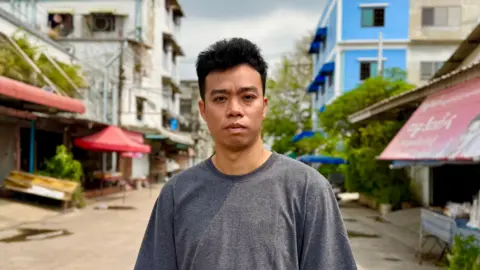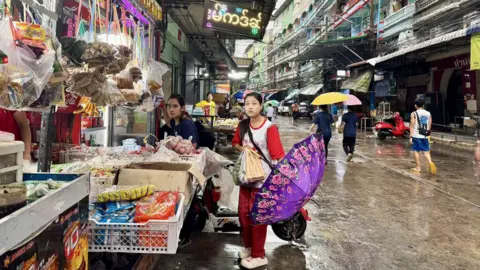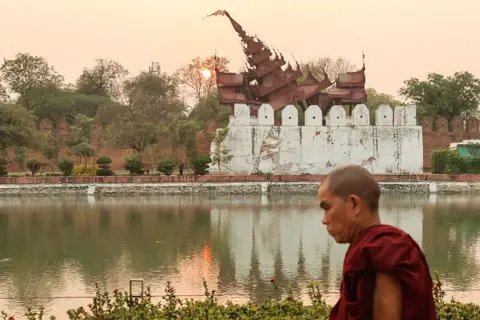 BBC / Tessa Wong
BBC / Tessa WongThe last time Soe Ko Ko Naing saw his great-uncle was in July, at his home by the banks of the Irrawaddy River.
Ko Naing, a supporter of Myanmar’s resistance against the military junta, was about to flee the country. Living in Min Kun, a small town in the military stronghold area of Sagaing, Ko Naing did not trust anyone enough to tell them of his plan – except his beloved Oo Oo (‘uncle’ in Burmese).
“I told him I was going to Thailand. He thought it was a good plan. He wished me good health and safety,” recalled Ko Naing, a 35-year-old labour rights activist.
Nearly a year on, Ko Naing is safe in Thailand. But his Oo Oo was killed by the powerful earthquake that struck Sagaing near Mandalay last Friday, claiming at least 2,000 lives.
“I have sleepless nights. I’m still suffering,” said Ko Naing.
“I have no remorse for leaving the country, because I had to. But I feel guilty because our people need us the most now. I feel helpless.”
Ko Naing is one of the millions of Myanmar’s diaspora anxiously watching from afar as their country struggles following its biggest earthquake in a century.
Like him, many are experiencing survivor’s guilt and a sense of helplessness. For some, these feelings are compounded by the fact that they cannot go back easily to help in rescue efforts or check on relatives, as they would face political persecution.
Thailand hosts the world’s biggest Myanmar diaspora community with about 4.3 million Myanmar nationals, though the figure is thought to be much higher if it includes undocumented migrants.
As a wealthier neighbour, it has long attracted people from Myanmar who make up a large section of its migrant workforce. The 2021 military coup and subsequent civil war have only swelled their ranks.
Some toil in the construction sector – many of the 400 workers at a Bangkok skyscraper that collapsed due to the quake were believed to be from Myanmar – while others work in Thailand’s agriculture and seafood industries.
On a drizzly Monday morning in Samut Sakhon, a fishing port near Bangkok that is home to many workers from Myanmar, men wearing the traditional Burmese longgyi and women with thanaka daubed on their cheeks thronged the alleys of a morning market.
Banners advertising SIM cards with cheap rates for calling Myanmar were plastered across buildings, while shops displayed signs in both Thai and Burmese.
“We have seen videos online of buildings collapsing and people trapped under the rubble. We feel so sad about not being able to do anything,” said 30-year-old factory worker Yin Yin, who like many in the crowd is worried about the situation back home.
Shopowner Thant Zin, 28, who is from a town in Sagaing unaffected by the quake, mourned the collapse of centuries-old pagodas and temples in his area. “What a disaster! I feel so bad… We have never experienced this extent of damage before.”
 BBC / Tessa Wong
BBC / Tessa WongAcross town Ko Naing sat in his office, checking for updates on his family in Myanmar. At least 150 of his relatives live in or around Sagaing and Mandalay.
Friday’s earthquake was so immense that it could be felt in Thailand, India and China. That day, as Ko Naing lay in bed in Samut Sakhon hundreds of kilometres from the epicentre, he said he felt the room shake for about 30 seconds.
He immediately went on social media and discovered the quake had occurred close to Min Kun. Then he came across a picture of Sagaing’s Ava Bridge – a local landmark – lying in mangled ruins in the Irrawaddy River. “I was shocked and devastated, I have a lot of relatives in that area. I thought, ‘it must be fake news’. But it was real.”
With slow communications in Myanmar in the quake’s immediate aftermath, Ko Naing only heard from his relatives on Saturday. Almost everyone was safe and accounted for, he was told, except for a distant great-aunt who died in Mandalay – and his Oo Oo.
A week before, Min Kun and its surroundings had been shelled by the military targeting the People’s Defence Forces resistance. Almost all of Ko Naing’s family in the town fled to Sagaing city or to a military-controlled area in Mandalay.
Oo Oo had refused to decamp and took shelter in the village monastery instead, knowing that the military would not attack Buddhist sites.
But on Friday, the monastery collapsed completely when the earthquake struck. His body was found in the rubble on Monday.
Ko Naing remembers Oo Oo as an open-minded and outspoken 60-year-old. In an area dominated by the military, the two bonded over their shared support for the resistance, especially after the coup.
In the summer the two would spend afternoons by the river, having lunch and catching up on the news. His great-uncle had no phone and no social media, and Ko Naing would help him check updates on the civil war. “I was his personal news agency,” he joked.
Oo Oo had to retire from his job as a boatman when he suffered a stroke which left him partially paralysed. Still, every morning, he would shuffle to his family’s tea shop and fry up ee kyar kwe, or fried doughsticks.
“He was my source of inspiration, especially in difficult times… he was the only one I could talk to. I got my resilience from him,” said Ko Naing.
 Getty Images
Getty ImagesThat resilience was something Ko Naing had to tap on when he made his dangerous escape from Myanmar along with his wife and five-year-old son. He was wanted by the military, which had issued a warrant for his arrest for taking part in peaceful protests.
His family travelled to the border where they crossed into Thailand illegally. As they ran in the dark past a Thai border police station, the family tripped over a large pipe and tumbled to the ground. His son fell backwards on his head. Ko Naing feared the worst.
But to his relief, his son let out a loud cry. Ko Naing slapped his hand over the child’s mouth, picked him up, and sprinted toward a people smuggler waiting for them with a motorcycle. They first headed to the Thai town of Mae Sot before eventually travelling to Samut Sakhon, where they secured the right to stay in Thailand.
Though he is now safe and has a good job, Ko Naing said: “To be honest I’m very depressed at the moment.
“First there was the pandemic, then the coup, then the military has been killing people who oppose them. People have been displaced.
“Then the earthquake has added to the suffering. Even after the earthquake, the military keeps bombing areas.
“I keep thinking it would be good if we can be there, if we can do something… it’s depressing living here, seeing the news about my country.”
He is working with the Myanmar diaspora to collect donations and send humanitarian assistance to the quake victims back home. They are also helping the Myanmar construction workers affected by the Bangkok building collapse.
“If we always feel depressed, nobody will help our people… it’s good that we’re alive. We can still do something.
“We have to make up our mind on how to rebuild, how we can move on.”

